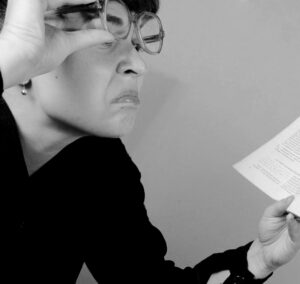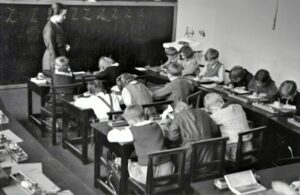“Remembering Miss Annabel Aslinger” is Chapter 23 from Curtis N. Coulter’s book This is the Way I Heard It: Folklore, Stories, and Tall Tales from Sale Creek, Tennessee. (Foresight Publishing 2022) An exceptional storyteller with sharp wit, Coulter transports the reader inside the very place that inspires his craft: his beloved Sale Creek. His stories are relatable throughout the Appalachian region. Appalachia Bare is very honored to showcase Curtis Coulter’s work.
Remembering Miss Annabel Aslinger
Miss Annabel Aslinger was the meanest, hardest, most intransigent teacher hundreds of Sale Creek students and I ever had. However, we were all fortunate to have been her students and are better people today because of it.
Miss Annabel was born in 1899 or 1900 and graduated from Sale Creek High School in 1917. She then worked her way through college. When she graduated with a degree in English, she started her teaching career at the Oakdale School on May Road in little Oakdale (Possum Trot) part of Sale Creek. It was a one-room schoolhouse with grades 1-8. When Oakdale, Mayflower, and Coulterville schools closed in 1924, she transferred to Sale Creek High School, where she taught high school English until she retired in 1966. Anyone who took tenth, eleventh, or twelfth grade English from that time until 1966 had to sit under Miss Aslinger’s tutelage. Miss Annabel never married. She and her unmarried sister Martha lived in the big, two-story Aslinger family home at the end of Iles Road until they finally sold their homeplace shortly after 1970.
Annabel was tough, and she did not take prisoners. No excuses for failure to complete assignments were accepted. If a person was still drawing breath into their body, had blood coursing through their veins, and was still warm, they had darn well better have done their homework, or a browbeating ensued. She required book reports every two weeks. I remember vividly going into her classroom with fear and trepidation on THE DAY! Everyone sat down like they were taking a final exam that determined life and death. It was white-knuckle time . . . two or three sharpened pencils, several sheets of paper, and your book. Prayers were allowed. As soon as she took roll, thirty-five pencils went to scratching furiously.
Book reports were quite involved events. First, the student had to select a book and notify Miss Annabel of their decision. In her stoic countenance, she would then inform the student if it was (1) appropriate, (2) long enough, and (3) on a high enough grade level for acceptance. In addition, if she had not read the book, you had to turn it over to her so that she could read it that night, and then she would allow you to use it. The books chosen had to be at least 200 pages in length because she required each student to read at least 600 pages of books during each quarter of the year. If you had overage, then she would apply that to your final average if you needed it. Rarely would she give more than half a point or a point on the final grade. She had this novel idea that you had to earn everything.
Often, Miss Aslinger would discuss a book report with the student and ask them questions about the book they had just read. She knew the book and could ascertain if the student had read it or was trying to fake it. You could not fool this woman, and there was no amount of shooting the breeze in the report that could satisfy her. No BS. She could cut right through it and give an F with no remorse. Many students felt that she had every book in the library.
Taking a test from Miss Annabel took everything out of a person. After leaving her room, one felt light-headed and staggering because the student’s entire being had been tested to the uttermost. It was like your brains had been sucked out of your head and left between the lines of the test paper.

Essay questions were like book reports. They were analyzed to the highest degree. After work, many people went home to relax or engage in a favorite activity. Miss Annabel’s favorite activity was grading papers. You could not get anything past her because she put an eagle eye on every written word.
I remember when I used the word “kid” on a paper referring to someone’s children. Miss Annabel caught it and marked it in red on my writing, saying that goats have kids. Humans have children, and it is not formal or polite English to use the word kids when referring to people.
I used a contraction in a book report one time. Red mark—formal English does not use contractions. I do not use contractions in formal writing for nearly sixty years hence.
I ended a sentence with a preposition . . . one time! Miss Annabel put an ugly red mark on my paper and corrected me. I have never done that again. It reminds me of what my supervising teacher told me when I was student teaching, “Placing prepositions at the end of sentences is something upon with which I will not put!”

I failed to put a comma after an introductory subordinate clause one time . . . red mark!
I put a comma after a single introductory prepositional phrase . . . one time . . . red mark, did not do that again. There must be at least two introductory prepositional phrases to qualify for using a comma.
I started a sentence with a conjunction . . . one time . . . just once—red mark. I never did that again.
Sentence fragment . . . red mark. Watched out for that infraction religiously after that.
Run-on sentence . . . red mark. Watched it.
Too much passive voice and use of the verb “to be.” Red mark. I started using active verbs.
Wordiness . . . red mark. Drat! Learned my lesson.
Wrong pronoun-antecedent use . . . red mark. Tried harder.
Incorrect subject/verb agreement . . . red mark! !@%@#!!@ Did not do that again.
Started too many sentences with the subject first . . . red mark. I started joining them together with more conjunction and using introductory clauses and phrases.
Incomplete thought . . . red mark. Darn it!
Too many choppy sentences . . . red mark. For the love of . . . does she miss anything?
Miss Annabel used so much red ink and red pencil that it is a wonder that it did not run out the door and down the steps to the office.

Miss Annabel stressed proper English. That is a term that is never heard anymore. She stressed the correct use of the English language so that her students could communicate effectively, logically, and at the highest level of what was considered good manners and proper English. Her students learned that she had rigid, high communication standards in the written word or conversation. She would often stop a student mid-sentence and correct their grammar usage on the spot.
Her former students never had trouble with freshman English in college because they had already lived through the fire with Miss Annabel. Many of them never had to study at all to pass college English. As my brother, Byron Coulter, related, “When I took college English at Middle Tennessee State University, I never cracked a book and got A’s in the course because of Annabel Aslinger.”
She had a reputation with many colleges because they all knew what kind of teacher she was and what kind of academic performance could be expected of her former students in a college setting.
My fellow students were intrigued to look at the contents of Miss Annabel’s grade book. She guarded it with her life. Coca-Cola’s formula is not protected any better than her grade book was. She kept it in a locked drawer, or if it was out on her desk, she was never more than three or four feet away. She would often clasp it to her chest during class changes and put both arms around it. We tried everything . . . reflection off her glasses, reflection off the light fixture, trying to sneak up behind her . . . nothing worked. To my knowledge, the student gaze never laid eyes on the contents of that book. We put our best men on the problem, and they all came up to abject failure!
There was no need to attempt to get her off subject so that you did not have a homework assignment. Tried that, done that . . . failed! She was not easily distracted. More work went into her classes than any other two combined. It reminds me of a joke about a headless torso found, and they were trying to identify it. It could very easily have turned out to have been one of Miss Annabel’s English students because the hind end had been chewed out, and the fingers had been worked to the bone!

Miss Annabel knew that students hated her class. Didn’t matter. She just bore down even more. Many students thought they hated her at the time and only referred to her as ANNABEL! Those opinions softened a lot when they graduated and applied for jobs or went to college. Invariably students would put Miss Annabel’s name down as a reference. When former students came back to the school to visit after being gone for a while, who was the first teacher they went to see? Miss Annabel. And she rejoiced with them on how well they were doing in college, on their job, or in the military. (Miss Annabel taught me never to start a sentence with a conjunction . . . I just did it right there for special effect.)
For the last couple of years that Miss Annabel taught school, she began having heart issues and had to take nitroglycerin pills even during class. Everyone knew that she was getting to the point physically that she would have to retire. Following the 1965-1966 school year, she did retire, but she continued coming out to the school to help her sister Martha with her first graders. This went on for a while until she was no longer able to come. If the truth is known, Miss Annabel probably died from a broken heart because she could not perform her beloved English teacher duties. That had been the main driving force in her entire life.
One of the things that I remember most about Miss Annabel that has stuck with me for my entire life is a conversation that I had with her after making some corrections on a book report. She asked me whether I knew what had caused one of her students’ behaviors to change so much recently. I told her that I did not know because I was not close friends with that student. I’ll never forget what she said. “Curtis, I want to tell you something, and I want you to remember it. As you go through life, you will make many friends and acquaintances. Still, if you have just one good friend, one that is as close as a brother or sister or even closer, one who cares about you, one that you can confide your innermost thoughts to, one who cares enough about you to tell you when you are wrong, you will be a fortunate person.” She was right.
So, I am happy to have been a student of Miss Annabel Aslinger, English teacher extraordinaire. I admired, respected, revered, and loved Miss Annabel.
As a sixth-generation native of Sale Creek, Curtis’ roots run deep in the town where his ancestors were original settlers in 1819. He is the author of five books, numerous periodicals, published geograhical maps, and other historical information about the communities of Sale Creek and Coulterville. Retired after a 40-year career with Hamilton County Schools, he continues to live in Sale Creek with Alice, his wife of fifty years. There he remains deeply committed to his community’s past, present and future. Appalachia Bare also published an excerpt from a chapter of his book, This is the Way I Heard It, entitled “The Complete Pitty Pat Hollow Tales.”
For more books written by Curtis Coulter, click the following images from Coulter Publications:
**Featured image – Jeffrey Hamilton, Unsplash










Those kinds of teachers are a dying race. Indeed, they are pretty much not allowed anymore. I loved this story and loved the author’s humor! I also loved the area where this story is set. I taught at Birchwood Elementary for six of the last seven years of it’s existence. God gave me a piece of heaven there.